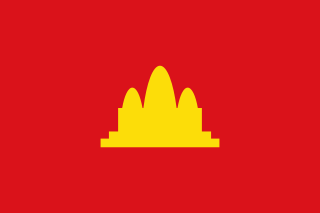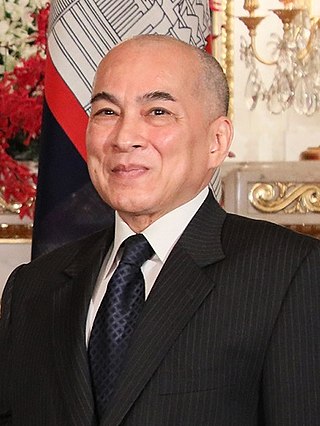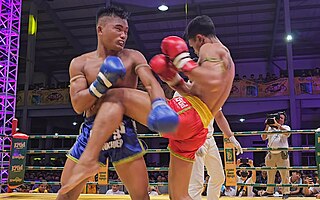
Cambodia competed at the 2011 World Aquatics Championships in Shanghai, China between July 16 and 31, 2011.

Cambodia competed at the 2011 World Aquatics Championships in Shanghai, China between July 16 and 31, 2011.
Cambodia qualified 3 swimmers. [1]
| Athlete | Event | Heats | Semifinals | Final | |||
|---|---|---|---|---|---|---|---|
| Time | Rank | Time | Rank | Time | Rank | ||
| Chamraen Youri Maximov | Men's 50m Freestyle | 27.48 | 83 | did not advance | |||
| Men's 400m Freestyle | 4:55.35 | 49 | did not advance | ||||
| Ponloeu Hem Thon | Men's 50m Freestyle | 27.22 | 81 | did not advance | |||
| Men's 50m Breaststroke | 33.48 | 42 | did not advance | ||||
| Athlete | Event | Heats | Semifinals | Final | |||
|---|---|---|---|---|---|---|---|
| Time | Rank | Time | Rank | Time | Rank | ||
| Vitiny Hemthon | Women's 50m Freestyle | 31.45 | 70 | did not advance | |||
| Women's 50m Backstroke | 36.57 | 54 | did not advance | ||||
The politics of Cambodia are defined within the framework of a constitutional monarchy, in which the king serves as the head of state, and the prime minister is the head of government. The collapse of communism set in motion events that led to the withdrawal of the Vietnamese armed forces, which had established their presence in the country since the fall of the Khmer Rouge. The 1993 constitution, which is currently in force, was promulgated as a result of the 1991 Paris Peace Agreements, followed by elections organized under the aegis of the United Nations Transitional Authority in Cambodia. The constitution declares Cambodia to be an "independent, sovereign, peaceful, permanently neutral and non-aligned country." The constitution also proclaims a liberal, multiparty democracy in which powers are devolved to the executive, the judiciary and the legislature. However, there is no effective opposition to the Prime Minister Hun Sen, who has been in power from 1984 up to 2023. His Cambodian People's Party won all 125 seats in the National Assembly in 2018 after the banning of opposition party CNRP and KNLF. KNLF became a main opposition exiled in Denmark after CNRP was dissolved. During the communal election in 2022 and the national election in 2023, there were no international observers. The government is considered to be autocratic.

The Khmer Rouge is the name that was popularly given to members of the Communist Party of Kampuchea (CPK) and by extension to the regime through which the CPK ruled Cambodia between 1975 and 1979. The name was coined in the 1960s by then Chief of State Norodom Sihanouk to describe his country's heterogeneous, communist-led dissidents, with whom he allied after his 1970 overthrow.

Phnom Penh is the capital and most populous city of Cambodia. It has been the national capital since the French protectorate of Cambodia and has grown to become the nation's primate city and its economic, industrial, and cultural centre. Before Phnom Penh became capital city, Oudong was the capital of the country.

Norodom Sihanouk was the King and Prime Minister of Cambodia. In Cambodia, he is known as Samdech Euv. During his lifetime, Cambodia was under various regimes, from French colonial rule, a Japanese puppet state (1945), an independent kingdom (1953–1970), a military republic (1970–1975), the Khmer Rouge regime (1975–1979), a Vietnamese-backed communist regime (1979–1989), a transitional communist regime (1989–1993) to eventually another kingdom.

Angkor Wat is a Hindu-Buddhist temple complex in Cambodia. Located on a site measuring 162.6 hectares within the ancient Khmer capital city of Angkor, it is considered as the largest religious structure in the world by Guinness World Records. Originally constructed as a Hindu temple dedicated to the deity Vishnu, it was gradually transformed into a Buddhist temple towards the end of the century.

Cambodia, officially the Kingdom of Cambodia, is a country in Mainland Southeast Asia. Cambodia borders Thailand to the northwest, Laos to the north, Vietnam to the east, and has a coastline along the Gulf of Thailand on the southwest. Cambodia spans an area of 181,035 square kilometres, and has a population of about 17 million. Its capital and most populous city is Phnom Penh.

Samdech Hun Sen is a Cambodian politician, and former army general who currently serves as the president of the Senate. He previously served as the prime minister of Cambodia from 1985 to 2023. Hun Sen is the longest-serving head of government in Cambodia's history. He is the president of the Cambodian People's Party (CPP), which has governed Cambodia since 1979, and has served as a member of the Senate since 2024. His full honorary title is Samdech Akka Moha Sena Padei Techo Hun Sen.

The Third Indochina War was a series of interconnected armed conflicts, mainly among the various communist factions over strategic influence in Indochina after Communist victory in South Vietnam, Laos, and Cambodia in 1975. The conflict primarily started due to continued raids and incursions by the Khmer Rouge into Vietnamese territory that they sought to retake. These incursions would result in the Cambodian–Vietnamese War in which the newly unified Vietnam overthrew the Pol Pot regime and the Khmer Rouge, in turn ending the Cambodian genocide. Vietnam had installed a government led by many opponents of Pol Pot, most notably Hun Sen, a former Khmer Rouge commander. This led to Vietnam's occupation of Cambodia for over a decade. The Vietnamese push to completely destroy the Khmer Rouge led to them conducting border raids in Thailand against those who had provided sanctuary.

Hor Namhong is a Cambodian diplomat who served in the government of Cambodia as Minister of Foreign Affairs from 1990 to 1993 and again from 1998 to 2016. He is a member of the Cambodian People's Party and has been a Deputy Prime Minister since 2004. He served as Cambodia's foreign minister for a combined tenure of 20 years.

Norodom Sihamoni is King of Cambodia. He became King on 14 October 2004, a week after the abdication of his father, Norodom Sihanouk.

Kun Khmer, or Pradal Serey, is a combat sport that originated in Cambodia. The sport consists of stand up striking and clinch fighting, where the objective is to knock an opponent out, force a technical knockout, or win a match by points. The sport was codified in Cambodia by the French colonial administration in the early 20th century, and was derived from centuries-old traditions, namely Bokator, the close-quarter combat system used during the Khmer empire. The official Khmer name of the sport is Kbach Kun Pradal Khmer.

Cambodian Americans, also Khmer Americans, are Americans of Cambodian or Khmer ancestry. In addition, Cambodian Americans are also Americans with ancestry of other ethnic groups of Cambodia, such as the Chams and Chinese Cambodians.

Nuon Chea, also known as Long Bunruot or Rungloet Laodi, was a Cambodian communist politician and revolutionary who was the chief ideologist of the Khmer Rouge. He also briefly served as acting Prime Minister of Democratic Kampuchea. He was commonly known as "Brother Number Two", as he was second-in-command to Khmer Rouge leader Pol Pot, General Secretary of the Party, during the Cambodian genocide of 1975–1979. In 2014, Nuon Chea received a life sentence for crimes against humanity, alongside another top-tier Khmer Rouge leader, Khieu Samphan, and a further trial convicted him of genocide in 2018. These life sentences were merged into a single life sentence by the Trial Chamber on 16 November 2018. He died while serving his sentence in 2019.

Siem Reap is the second-largest city of Cambodia, as well as the capital and largest city of Siem Reap Province in northwestern Cambodia.

The Cambodian–Thai border dispute began in June 2008 as part of a century-long dispute between the Kingdom of Cambodia and the Kingdom of Thailand involving the area surrounding the 11th-century Preah Vihear Temple, in the Dângrêk Mountains between Choam Khsant District, Preah Vihear Province of northern Cambodia and the Kantharalak District, Sisaket Province of northeastern Thailand.
Prostitution in Cambodia is illegal, but prevalent. A 2008 Cambodian Law on Suppression of Human Trafficking and Sexual Exploitation has proven controversial, with international concerns regarding human rights abuses resulting from it, such as outlined in the 2010 Human Rights Watch report.

Cambodia–North Korea relations refers to the bilateral relationship between Cambodia and the DPRK. The DPRK has an embassy in Phnom Penh; Cambodia has an embassy in Pyongyang. The North Korean embassy is located on Sihanouk Boulevard, Phnom Penh, directly adjacent to the Prime Minister's residence.

The Cambodian genocide was the systematic persecution and killing of Cambodian citizens by the Khmer Rouge under the leadership of Prime Minister of Democratic Kampuchea, Pol Pot. It resulted in the deaths of 1.5 to 2 million people from 1975 to 1979, nearly 25% of Cambodia's population in 1975.
The Tiny Rascal Gang, is a primarily Cambodian-American gang based in Long Beach, California. During the 1990s, Mexican Mafia "green light" hit lists began including the TRG during the 1990s, and Sureños were soon at war with them. The Mexican Mafia ordered the West Side Longo gang to put aside its rivalry with the East Side Longo and support their former rivals against the TRG.